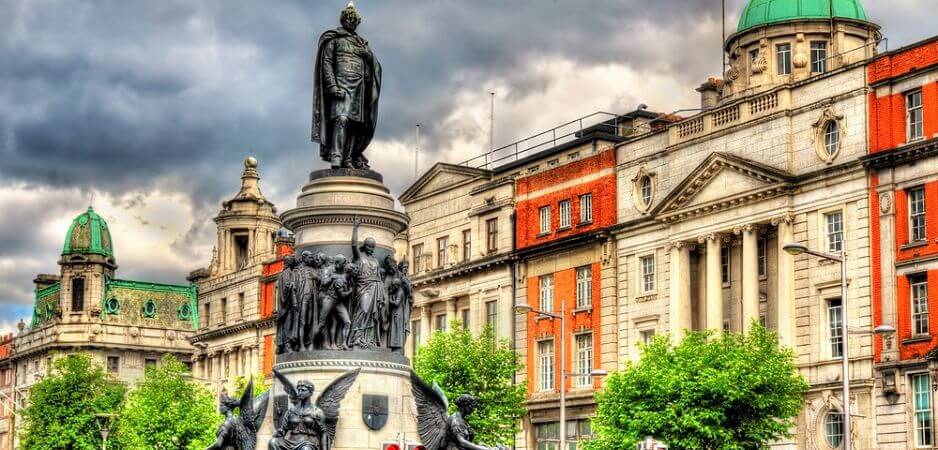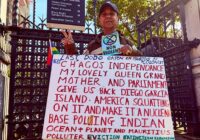To be true to Daniel O’Connell’s legacy, Irish people in the 21st century must take their share of responsibility for facing up to the international issues of our time.
On a recent trip to Genoa, I came across the house on the Via Al Ponte Reale where Daniel O’Connell, the great Irish democratic leader of the 19th century, died in 1847 on his way to Rome. O’Connell, who knew he was dying, wanted to have an audience with the pope before he passed away. Unfortunately, his death came too soon in Genoa, where he had to disembark because he had become so ill.
Today, the house where he passed is marked by two plaques, one in Latin erected shortly after he died and another on the 50th anniversary of his death by the Catholics of Genoa in appreciation of his work for religious liberty. The fact that he was remembered in this way 50 years after his death is a sign of his immense international reputation.
LOOKING BACK
Throughout his political career from 1800 to 1847, O’Connell had a vision that extended far beyond Ireland. As he said of himself, “my sympathy is not confined to the narrow limits of my own green Ireland.”
In his first days as a member of parliament after Catholic emancipation allowed him to take his seat, he presented a petition from Cork against slavery in the colonies. He suggested abolishing the practice of arresting people for debt without judicial procedure, and he spoke in favor of a petition supporting the rights of Jews (who, like Catholics, had been denied the right to become MPs).
O’Connell favored the secret ballot and the reform of Parliament. He fought against the remaining duties on Irish exports of malt, coal and paper to Britain. Had he been alive today, he would not have been a supporter of Brexit.
Although he was not familiar with Ulster, he did try to reach out to loyalists, even going so far as drinking a toast to King William at a dinner in Drogheda — a risky thing to do at any time.
He made big financial sacrifices for the causes in which he believed. He could have taken up high legal office — for instance as master of the rolls, a highly remunerative legal office — but chose to stay in Parliament as an unpaid MP to fight on for the repeal of the union.
Like any good politician, O’Connell was assiduous in answering his correspondence. At one stage, he was answering up to 200 letters a day, and the postage alone cost him £10 per day at a time when a pound was infinitely more valuable than it is today.
He had a deep aversion to politically-motivated violence, an issue on which he differed with Thomas Davis and others who romanticized the 1798 Rebellion. O’Connell told the Dublin Corporation that, for a political purpose, he would “not for all the universe consent to the effusion of a single drop of human blood except my own.” On another occasion, he said, “Human blood is no cement for the temple of human liberty.”
 It was because of his fear of the loss of life that he called off the monster meeting at Clontarf, a decision that the Young Ireland leaders consented to at the time, but subsequently criticized. Asked afterward to name the act of his political career of which he was most proud, he said it was not Catholic emancipation, but the decision to cancel the mass meeting at Clontarf and thereby prevent the “plains of Clontarf being, for a second time, saturated with blood.” He knew that violence would soon get beyond the control of its initiators, as we learned in the 1916 to 1923 period.
It was because of his fear of the loss of life that he called off the monster meeting at Clontarf, a decision that the Young Ireland leaders consented to at the time, but subsequently criticized. Asked afterward to name the act of his political career of which he was most proud, he said it was not Catholic emancipation, but the decision to cancel the mass meeting at Clontarf and thereby prevent the “plains of Clontarf being, for a second time, saturated with blood.” He knew that violence would soon get beyond the control of its initiators, as we learned in the 1916 to 1923 period.
O’Connell believed in passive resistance and was innovative in devising ways to use it. He pioneered mass meetings and parish-level political organization. In that sense, he was ahead of the rest of Europe. He was the founder of mass political participation, and this was recognized in other countries at the time.
THE MORAL ISSUES OF OUR TIME
He also worked for human rights across the globe. His opposition to human slavery was not confined to the colonies of the British Empire. He opposed slavery in the United States, unlike the Young Irelander, John Mitchell, who subsequently actively supported it. O’Connell’s opposition to slavery in the US was deeply appreciated by those agitating within America itself for the abolition of slavery.
O’Connell also refused political donations from slave owners in the US, and he attacked the attempt to establish Texas as an independent slave-owning state seceding from Mexico. O’Connell had even criticized George Washington for owning slaves.
Finally, O’Connell clashed with the Irish-born Catholic Bishop John Hughes of New York, who criticized him for his “intolerable interference in American affairs.” Patrick Geoghegan, his most recent biographer, says his declarations on slavery were a key factor in alienating the Young Irelanders, who believed the Repeal Association should only address domestic affairs, not foreign.
To be true to Daniel O’Connell’s legacy, Irish people in the 21st century must take their share of responsibility for facing up to the big, moral, international issues of our time. They must not confine their concern to their “own green Ireland.”
The views expressed in this article are the author’s own and do not necessarily reflect Fair Observer’s editorial policy.
Photo Credit: Leonid Andronov / Shutterstock.com
Support Fair Observer
We rely on your support for our independence, diversity and quality.
For more than 10 years, Fair Observer has been free, fair and independent. No billionaire owns us, no advertisers control us. We are a reader-supported nonprofit. Unlike many other publications, we keep our content free for readers regardless of where they live or whether they can afford to pay. We have no paywalls and no ads.
In the post-truth era of fake news, echo chambers and filter bubbles, we publish a plurality of perspectives from around the world. Anyone can publish with us, but everyone goes through a rigorous editorial process. So, you get fact-checked, well-reasoned content instead of noise.
We publish 2,500+ voices from 90+ countries. We also conduct education and training programs
on subjects ranging from digital media and journalism to writing and critical thinking. This
doesn’t come cheap. Servers, editors, trainers and web developers cost
money.
Please consider supporting us on a regular basis as a recurring donor or a
sustaining member.
Will you support FO’s journalism?
We rely on your support for our independence, diversity and quality.






